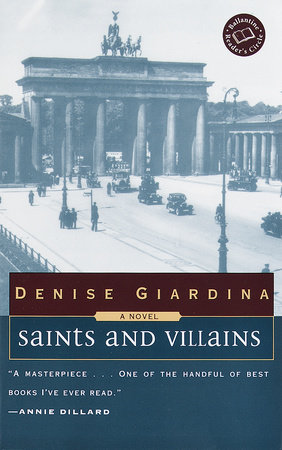Saints and Villains Reader’s Guide
By Denise Giardina


1. This story raises important questions about personal responsibility in the face of inhumane behavior. What led Dietrich Bonhoeffer, a painfully shy and introspective man, to join the German resistance?
2. Why does Bonhoeffer refuse to conduct the funeral service for his sister’s father-in-law? Discuss the impact this choice has on his life.
3. This story illustrates how some people found the courage to challenge a corrupt and brutal regime. What did you know of the German resistance prior to reading this book? What factors do you think led some people to resist in the face of almost insurmountable odds?
4. Bonhoeffer made great sacrifices yet he was always battling his fears and demons. As one reviewer has said: "Giardina makes [Bonhoeffer] the reportedly stiff, bespectacled intellectual . . . into a hero to whom any reader can relate." What does the face of courage look like in this book? How do you define courage and heroism?
5. "He who believes does not flee." Bonhoeffer has opportunities to escape Nazi Germany yet he chooses to remain and fight. Why do you think is this so? In his place, what would you have done?
6. As a religious leader, Bonhoeffer struggled to reconcile his faith with his eventual decision to join what was, in part, a conspiracy to murder. Did he rest easy with this decision? Under what circumstances, if any, is murder is justifiable?
7. Discuss the impact of Bonhoeffer’s experiences in the United States on his later understanding of the plight of Jews in Nazi Germany. How is Bonhoeffer changed by his time abroad? How do his experiences in Harlem and on Gauley Mountain affect his actions upon his return to Nazi Germany?
8. This story recounts the Allied rejection of overtures by the German resistance. Why do you think the German resistance failed to get foreign assistance? What if the German resistance had received aid in time? Do you think the outcome might have been different?
9. Why do Elisabeth Hildebrandt and Bonhoeffer separate? What forces drive them apart?
10. Why do you think Alois Bauer ultimately tries to save Bonhoeffer? What might account for the very different paths these two men have chosen?
11. There are no simple villains in this story. How do you understand the very patriotic German couple that sent their son off to fight for Hitler, yet also befriended Elisabeth in her time of need?
12. As this story illustrates, the rise to power of Hitler and Nazi Germany was facilitated by compromise and accommodation in the international community. Why do you think this was so? Why did a dissenting voice such as Bonhoeffer’s get lost or shouted down?
13. Many people would wonder what kind of God would allow something like the Holocaust to happen and would lose their religious faith in the wake of the Holocaust. How does Bonhoeffer address these issues and maintain his faith? How does the nature of his faith change over the course of his lifetime?
14. The tremendous scope of death and destruction in the Holocaust can be difficult to comprehend. How did this man’s story help you to process such acts of unimaginable evil?
15. Bonhoeffer once said, "We must live as if God does not exist." What was this minister and theologian trying to tell us with this statement?
16. In this story, Mozart’s Mass in C Minor (the original manuscript of which was lost during the war) plays a pivotal role. Recently there has been much news coverage of renewed attempts to retrieve art and money lost during World War II. How do we assess blame in such situations? Who should be held accountable for such losses?
17. Which characters, besides Bonhoeffer, did you find to be the most compelling and why?
18. Why did your group choose to read this particular work? How does this novel compare with other works your group has read?
Just for joining you’ll get personalized recommendations on your dashboard daily and features only for members.
Find Out More Join Now Sign In